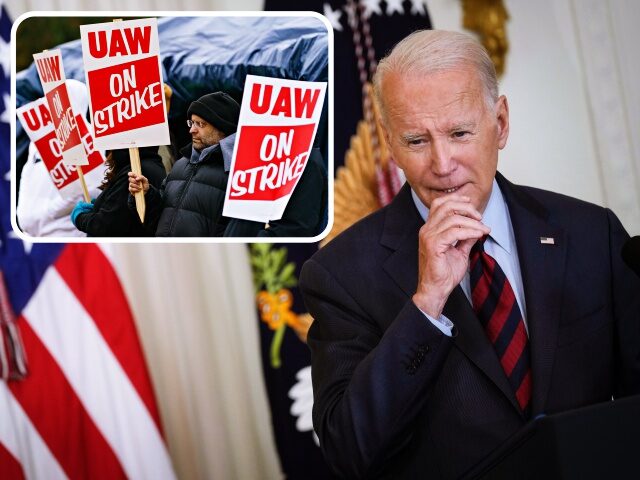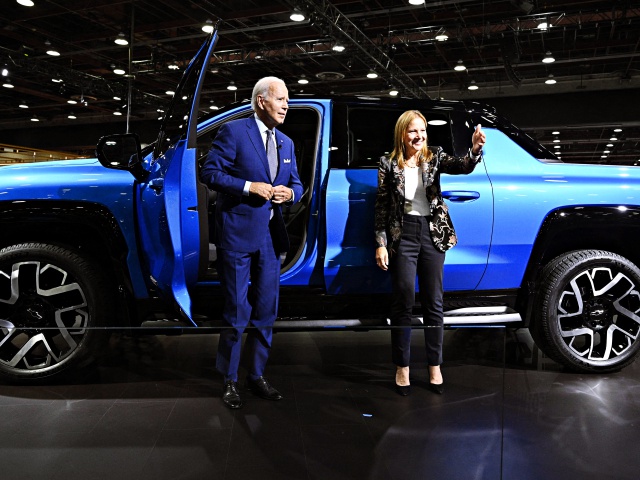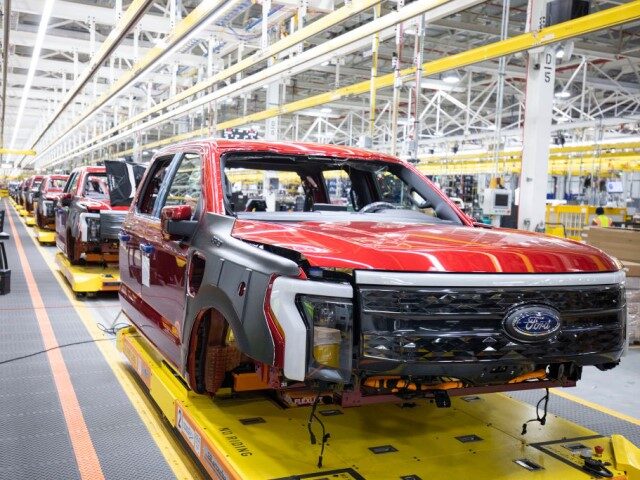WALL STREET JOE
American Auto Workers ‘Feel Abandoned’ by Democrats as Biden Agenda Shifts Billions to Companies

American auto workers, about 150,000 of whom are represented by the United Auto Workers (UAW) union, are increasingly fed up with Democrats as President Joe Biden pursues a green energy agenda set to eliminate auto jobs and shift billions up to corporate executives.
“UAW members feel abandoned by the Democratic Party,” former UAW President Bob King told Politico this week, noting the Democrat majority’s continued support for job-killing free trade as well as Biden’s Inflation Reduction Act (IRA) which is handing out billions in taxpayer subsidies to auto companies and their top line.
“I think there’s a segment of the Democratic Party that sees itself as serving corporations rather than the common good … we’ve had a lot of disappointments,” King said.
As Breitbart News has chronicled, Biden’s IRA is showering automakers with a massive windfall via tax credits for electric vehicles (EVs) made in the United States, Canada, and Mexico.
At the same time, a publicly funded transition from combustion engines to EVs has the potential to eliminate millions of American auto jobs altogether.
UAW President Shawn Fain, who has made sure to withhold the union’s endorsement from Biden, has called out the green energy agenda for merely shifting wealth to the top as auto workers see their salaries slashed.
“Workers can’t be left behind in this transition,” Fain said last week:
When we talk about the EV transition, you’re talking about 20% of the powertrain workers in the Big Three stand to lose their jobs down the road if we go from [internal combustion] engines to battery power. And you can’t call this a just transition if you’re going to go from $32 an hour wages down to $16 an hour. [Emphasis added]
In a recent UAW report, the union looked at General Motors (GM) and LG’s EV battery plant in Lordstown, Ohio, known as Ultium Cells, which replaced GM’s old vehicle assembly plant.
While workers at the former plant earned up to $30 an hour, the UAW notes that workers at the Ultium Cells plant had been earning about $16.50 an hour with a raise to $20 an hour after seven years. This suggests a 45 percent drop in wages for auto workers in Lordstown.
Weeks ago, the UAW fought to secure pay increases at Ultium Cells, scoring workers an additional $3 to $4 an hour and thousands of dollars in back pay.
Now, the UAW is warning the nation’s auto companies that it will go on strike if certain demands are not met. For instance, the UAW is looking to secure historic pay increases for workers to mirror the massive pay increases that executives have gotten.
“The Big Three CEOs saw their pay increase by 40 percent over the last four years, while our pay only went up by 6 percent,” Fain said this month.
General Motors (GM) CEO Mary Barra, in 2022, raked in almost $29 million, which is 362 times the median paycheck of the average GM employee. Such large pay disparities between executives and employees were not always the case.
A study from the Economic Policy Institute (EPI) last year found that company executives are earning about 399 times their average employees’ paycheck, whereas in 1965, they were earning about 20 times their average employees’ paycheck.
Fain said Biden’s IRA cannot continue to drive the wage gap.
“There’s a lot with the EV transition that has to happen, and there’s hundreds of billions of our taxpayer dollars that are helping fund this, and workers cannot continue to be left behind in that equation,” Fain told Politico.
John Binder is a reporter for Breitbart News. Email him at jbinder@breitbart.com. Follow him on Twitter here.
Dem Rep. Slotkin: Inflation Hurting Auto Workers Helped Set the Scene for Auto Talks
On Thursday’s broadcast of CNN’s “Inside Politics,” Rep. and U.S. Senate candidate Elissa Slotkin (D-MI) stated that “the scene for these negotiations” between automakers and the UAW was set by large profits for auto companies and the fact that “people who are working at those facilities…are struggling and have less money in their pockets because of inflation.”
Slotkin said, “I just think the scene for these negotiations was set before they really even started. You have our Big Three, who are making, in some cases, record profits, and you have people who are working at those facilities, who are struggling and have less money in their pockets because of inflation. So, I think the truth is, we knew that it was going to be an exciting September. It is an exciting September. No one wants a long strike. We know what that does to Michigan. We know what that does to individuals working at these facilities and the rest of the country. But I think that, as someone who used to negotiate international agreements, you set the stage for these negotiations in the weeks ahead of it. And that’s what’s happened. It’s come down to tonight.”
Follow Ian Hanchett on Twitter @IanHanchett
Carney on ‘Kudlow’: A UAW Strike Will Be Biden’s Fault Because His Policies Have Destroyed Autoworkers’ Wages
President Joe Biden’s inflationary economic policies and green electric vehicle agenda is to blame if the United Auto Workers (UAW) union decides to strike, Breitbart Economics Editor John Carney told Fox Business host Larry Kudlow on Wednesday.
The 150,000-member UAW could go on strike as early as Thursday if they cannot reach an agreement with Detroit’s Big Three automakers over their contracts, which expire before midnight on Thursday.
Carney told Kudlow that the union and the Big Three have reportedly not made progress on a deal.
“Look, this is actually the fault of Joe Biden because one of the things driving this strike is the fact that people’s wages have deteriorated so much,” Carney said. “Of course, the unions want to be paid more because they’ve seen their buying power go down. Their cost of living has skyrocketed. So, of course they need to make more money.”
Kudlow observed that the transition to electric vehicles (EVs) is a major factor in the negotiations because “a lot less labor is necessary” to make an EV than a traditional gas-powered vehicle. Kudlow cited a claim made by Kevin Hassett, the former chairman of the Council of Economic Advisers in the Trump administration, that the auto industry could lose as many as 500,000 jobs due to the EV transition.
This is as topic that Breitbart News has covered extensively, starting with an article by this writer in October 2020 warning that then-candidate Joe Biden’s rapid push to electric vehicles would have a devastating impact on the American auto industry. The article predicted:
When you eliminate the internal combustion engine, you eliminate hundreds of components that comprise it. This will dramatically change the landscape of the automotive industry for millions of parts suppliers, engineers, mechanics, and countless blue-collar workers. That’s because the average electric vehicle deletes over 300 components. The fuel-powered vehicle’s engine, transmission, gas tank, radiator, hoses, pumps, starter motor, mounting brackets, etc. will all become obsolete.
This will dramatically reduce the amount of money it costs to produce a vehicle, but it will also reduce the number of blue-collar workers all along the supply chain needed to create those parts and assemble the finished product. However, the sticker price of the electric vehicle will not be reduced. These vehicles will be just as expensive for consumers as gas-powered vehicles even though they cost less to manufacture. In other words, EVs will be a cash cow for the big auto companies, but will not necessarily benefit American workers, American consumers (who are still skeptical of EVs), or even the American environment which relies on a fossil fuel-based power grid to charge EV batteries.
This prediction has sadly proven all too true and is the reason why the UAW has withheld its support for Biden’s reelection and why, as Politico reported on Wednesday, autoworkers feel “abandoned” by Democrats and the Biden administration.
While autoworkers are seeing their wages slashed due to the EV adoption, the Big Three executives have enjoyed a windfall thanks to the EV tax credits in Biden’s Inflation Reduction Act (IRA).

President Joe Biden with General Motors CEO Mary Barra looks at a Chevrolet Silverado electric vehicle as he tours the 2022 North American International Auto Show in Detroit, Michigan, on September 14, 2022. (MANDEL NGAN/AFP via Getty Images)
UAW President Shawn Fain has argued that autoworkers are being “left behind” in this new EV subsidized auto industry, as their jobs and wages are gutted.
“When we talk about the EV transition, you’re talking about 20 percent of the powertrain workers in the Big Three stand to lose their jobs down the road if we go from [internal combustion] engines to battery power. And you can’t call this a just transition if you’re going to go from $32 an hour wages down to $16 an hour,” Fain said in an interview last week.
This massive pay disparity is at the heart of the current negotiations and could very well lead to a strike, as Breitbart’s John Binder reported Wednesday:
…[T]he UAW is looking to secure historic pay increases for workers to mirror the massive pay increases that executives have gotten.
“The Big Three CEOs saw their pay increase by 40 percent over the last four years, while our pay only went up by 6 percent,” Fain said this month.
General Motors (GM) CEO Mary Barra, in 2022, raked in almost $29 million, which is 362 times the median paycheck of the average GM employee. Such large pay disparities between executives and employees were not always the case.
A study from the Economic Policy Institute (EPI) last year found that company executives are earning about 399 times their average employees’ paycheck, whereas in 1965, they were earning about 20 times their average employees’ paycheck.
President Biden’s Inflation Reduction Act electric vehicle subsidies are also driving this decimation of autoworker pay, while driving up executive profits.

United Auto Workers members walk in the Labor Day parade in Detroit on September 4, 2023. The union is threatening to strike if they cannot reach an agreement with the Big Three automakers by the time their contracts expire on September 14. (AP Photo/Paul Sancya)
“There’s a lot with the EV transition that has to happen, and there’s hundreds of billions of our taxpayer dollars that are helping fund this, and workers cannot continue to be left behind in that equation,” Fain told Politico.
Carney agreed with Fain’s argument that autoworkers should not be the only ones bearing the cost for this EV push.
“If we have a big society move that we want to push electric cars, union workers are saying, ‘Why should we bear that cost?’ That should be spread around if everybody’s going to benefit because we’re going to save the climate or whatever. Then why should it only be union workers bearing the cost,” Carney told Kudlow.
Thanks to Bidenomics, the economic pain autoworkers are feeling is also exacerbated by the inflation eating into their household incomes. The U.S. Census data released this week revealed that the median income of U.S. households fell in 2022 by 2.3 percent, which, as Carney reported in Tuesday’s Breitbart Business Digest, was the worst decline since 2010, when Barack Obama was president. Family household income faired even worse, dropping by 2.9 percent last year, and child poverty increased by 4.6 percent.
According to the Census data, the region hit the hardest in 2022 by Bidenomics was the Midwest—the home of the Rustbelt states like Michigan which are the beating heart of the American auto industry.
That last fact will undoubtably be a factor in any potential UAW strike.
Rebecca Mansour is a Senior Editor-at-Large for Breitbart News and a proud native of Metro Detroit. Follow her on X at @RAMansour.
UAW to Strike All Big Three Automakers at the Same Time for First Time in History

The United Auto Workers (UAW) union will go on strike against all of Detroit’s big three automakers at the same time for the first time in the union’s history, after General Motors, Ford, and Stellantis failed to reach a labor agreement with the union before their contracts expired Thursday night.
“Tonight for the first time in our history we will strike all three of the big three at once,” UAW president Shawn Fain said on Thursday. They are prepared to strike at midnight, according to Fain.
They plan to strike at a General Motors assembly plant in Wentzville, Missouri; a Stellantis plant in Toledo, Ohio; and a Ford plant in Wayne, Michigan.
“If we need to go all out, we will,” Fain declared. “Everything is on the table.”
Roughly 150,000 American auto workers are represented by the UAW union. President Joe Biden’s green agenda is a major concern for autoworkers whose jobs are being eliminated by Biden’s rapid push for a transition to electric vehicles (EVs), which require less workers to produce than gas-powered vehicles. As Breitbart’s Senior Editor-at-Large Rebecca Mansour reported, “While autoworkers are seeing their wages slashed due to the EV adoption, the Big Three executives have enjoyed a windfall thanks to the EV tax credits in Biden’s Inflation Reduction Act (IRA).”
Breitbart’s John Binder reported:
“UAW members feel abandoned by the Democratic Party,” former UAW President Bob King toldPolitico this week, noting the Democrat majority’s continued support for job-killing free trade as well as Biden’s Inflation Reduction Act (IRA) which is handing out billions in taxpayer subsidies to auto companies and their top line.
“I think there’s a segment of the Democratic Party that sees itself as serving corporations rather than the common good … we’ve had a lot of disappointments,” King said.
…
General Motors (GM) CEO Mary Barra, in 2022, raked in almost $29 million, which is 362 times the median paycheck of the average GM employee. Such large pay disparities between executives and employees were not always the case.
A study from the Economic Policy Institute (EPI) last year found that company executives are earning about 399 times their average employees’ paycheck, whereas in 1965, they were earning about 20 times their average employees’ paycheck.
As Breitbart News’s Economics Editor John Carney put it, “the looming strike by the United Auto Workers is as much a protest against Bidenomics as it is the policies of General Motors, Ford Motor Company, and Stellantis.”
As Carney detailed:
While all Americans have been hard hit by the surge of inflation tied to Biden’s deficit spending, Detroit’s autoworkers have had it far worse than most of their fellow Americans. The place we once called the Arsenal of Democracy was ground zero for Bidenflation’s destructive explosion.
The promise of low inflation was broken by the bloated fiscal policies of the Biden administration and the loose money policies of the Federal Reserve.
It only made matters worse that the Democrats time and again sought to downplay inflation or pass the buck onto the greed of corporations or Putin’s invasion of Ukraine. As recently as this month, Democrat leftist stalwart Rep. Alexandria Ocasio-Cortez of New York was circulating the idea that inflation was just “propaganda.” Even when Democrats admit inflation has been problematic and linked to excessive fiscal and monetary expansion, they act as if it were a sacrifice necessary because of the pandemic. Never have they mentioned that the sacrifice was borne more heavily by some than others, much less acknowledged the prices paid by our autoworkers.
However, Carney said the strike would not be a “catastrophe” for the economy, as other outlets have predicted.
Ford blamed the UAW for the lack of a deal, saying the union’s counteroffer “showed little movement from the union’s initial demands submitted Aug. 3.”
“We don’t want there to be a strike. We’re ready to work until the deadline,” Ford CEO Jim Farley told CNN Thursday. “We’d like to make history by making a historic deal, not having a historic strike,”
The UAW is asking a 36 percent boost in pay over four and a half years, but the automakers countered with offers that are roughly half of that increase, according to the Associated Press.
Jordan Dixon-Hamilton is a reporter for Breitbart News. Write to him at jdixonhamilton@breitbart.com or follow him on Twitter.
No comments:
Post a Comment